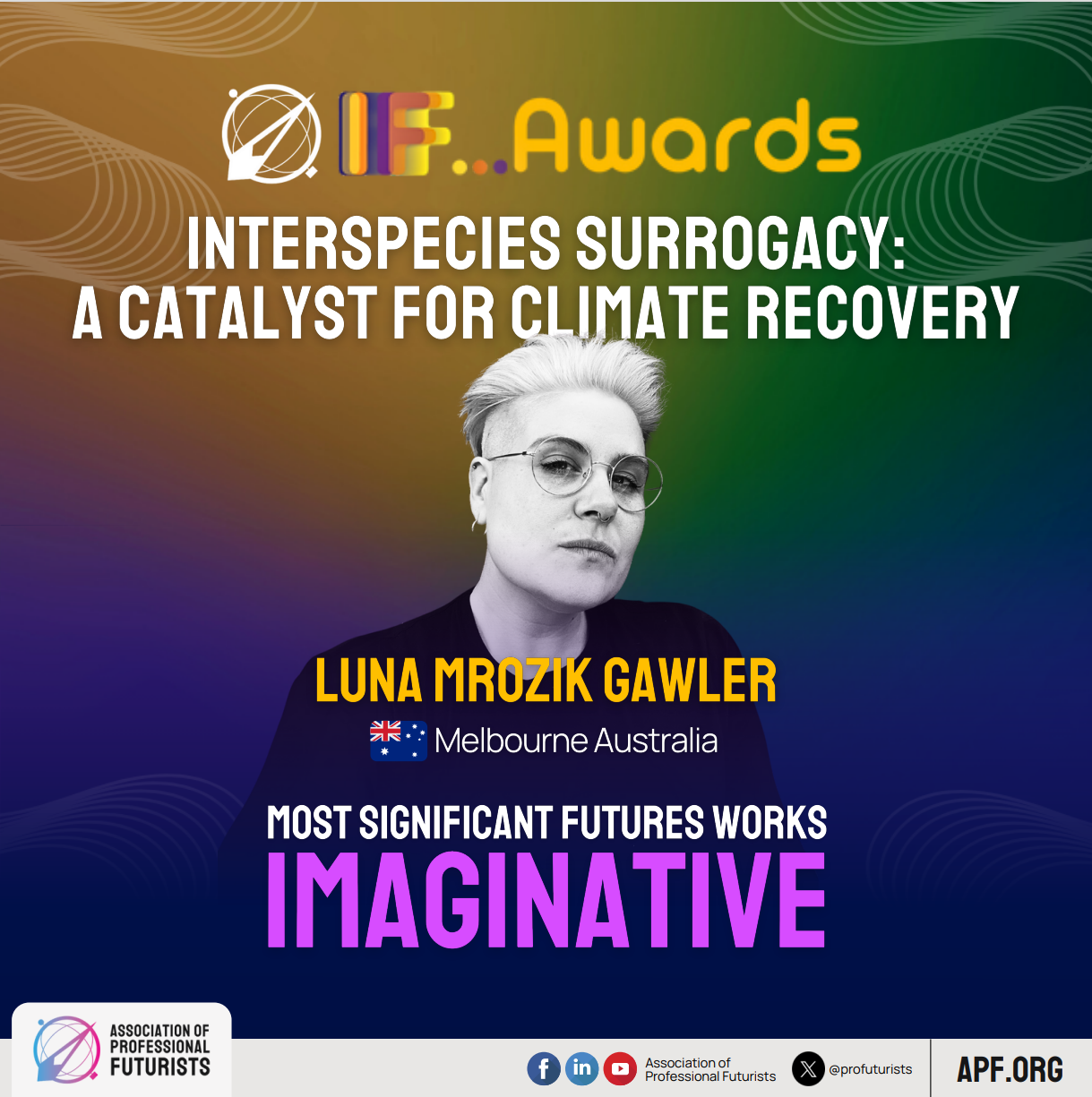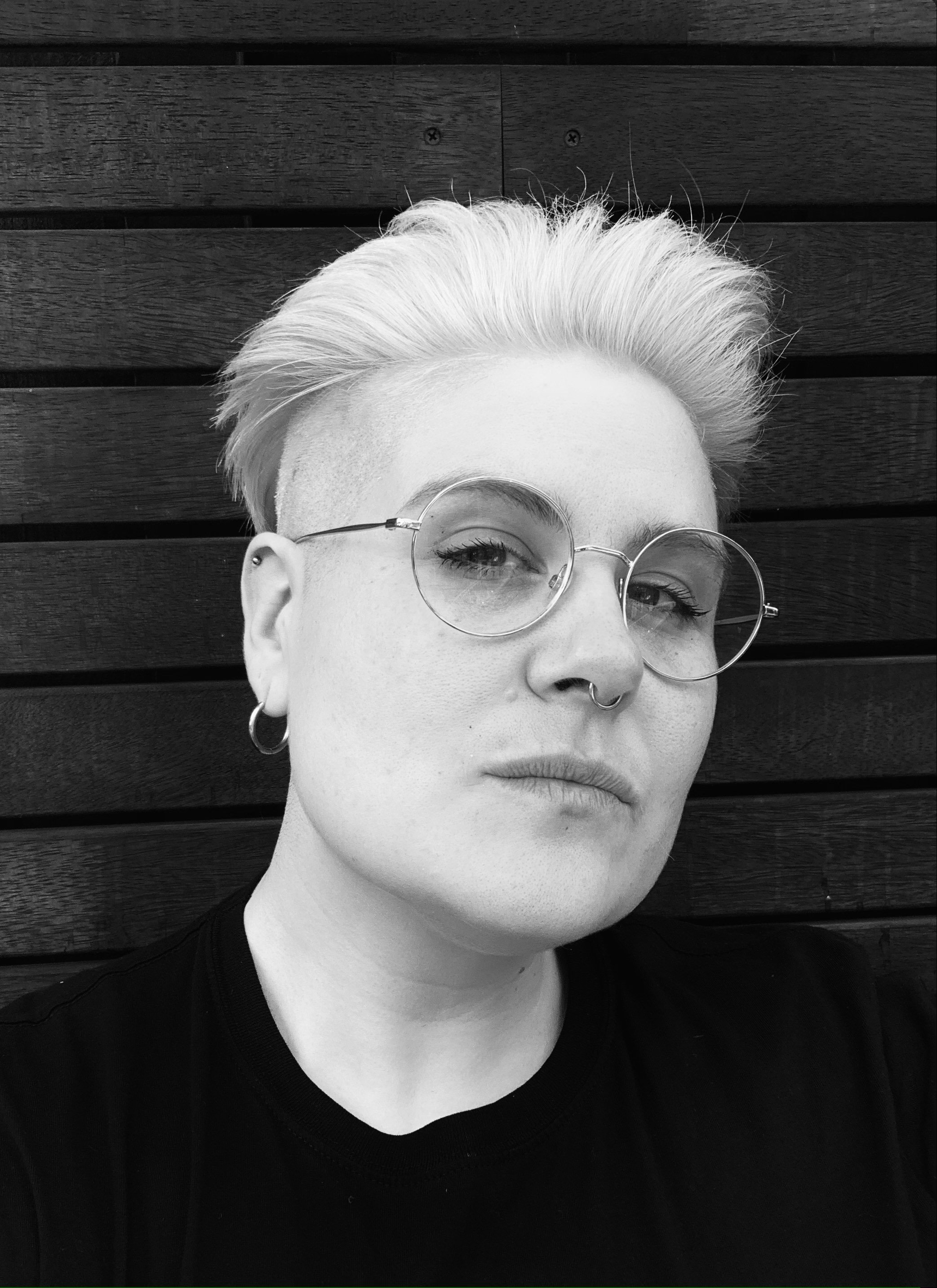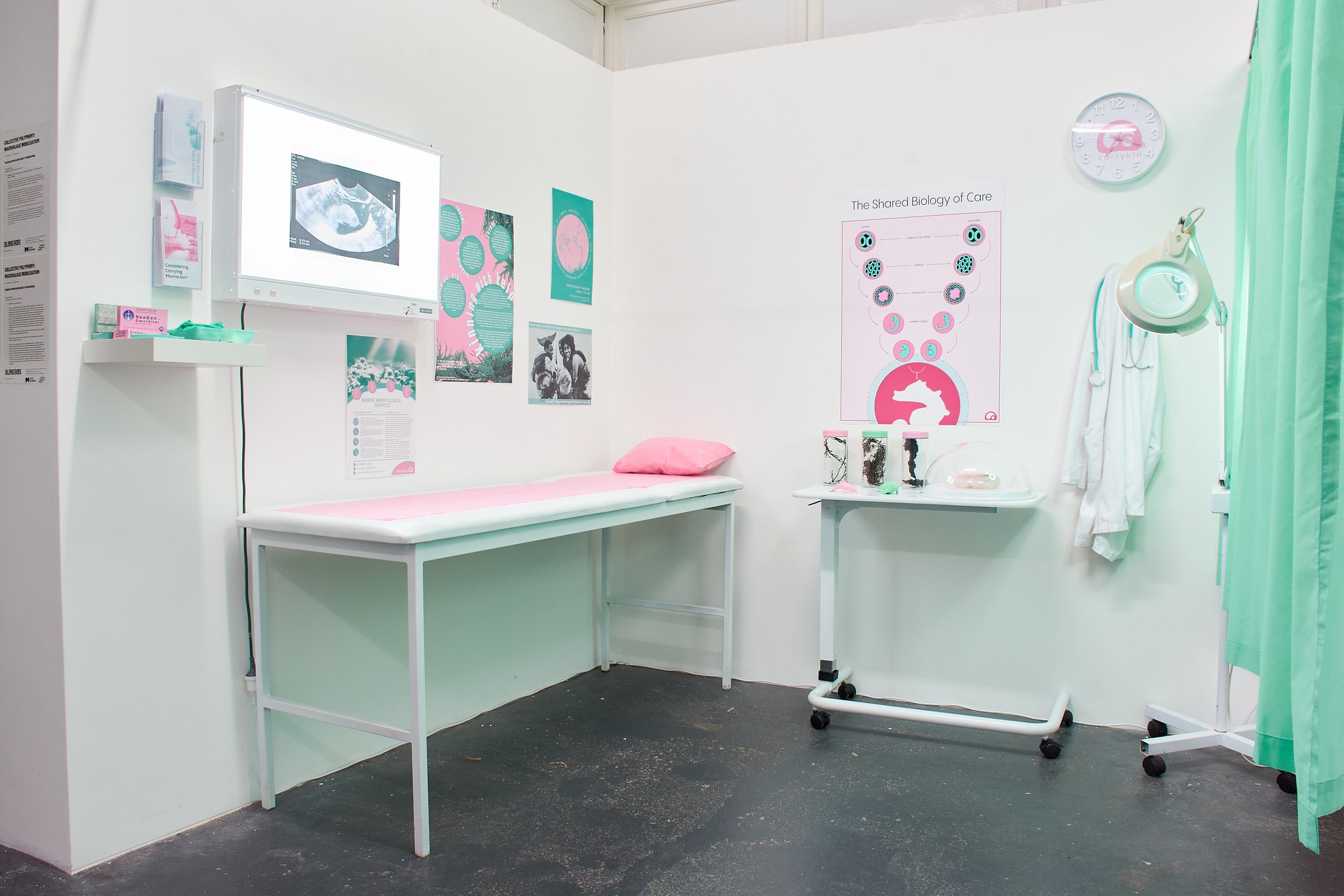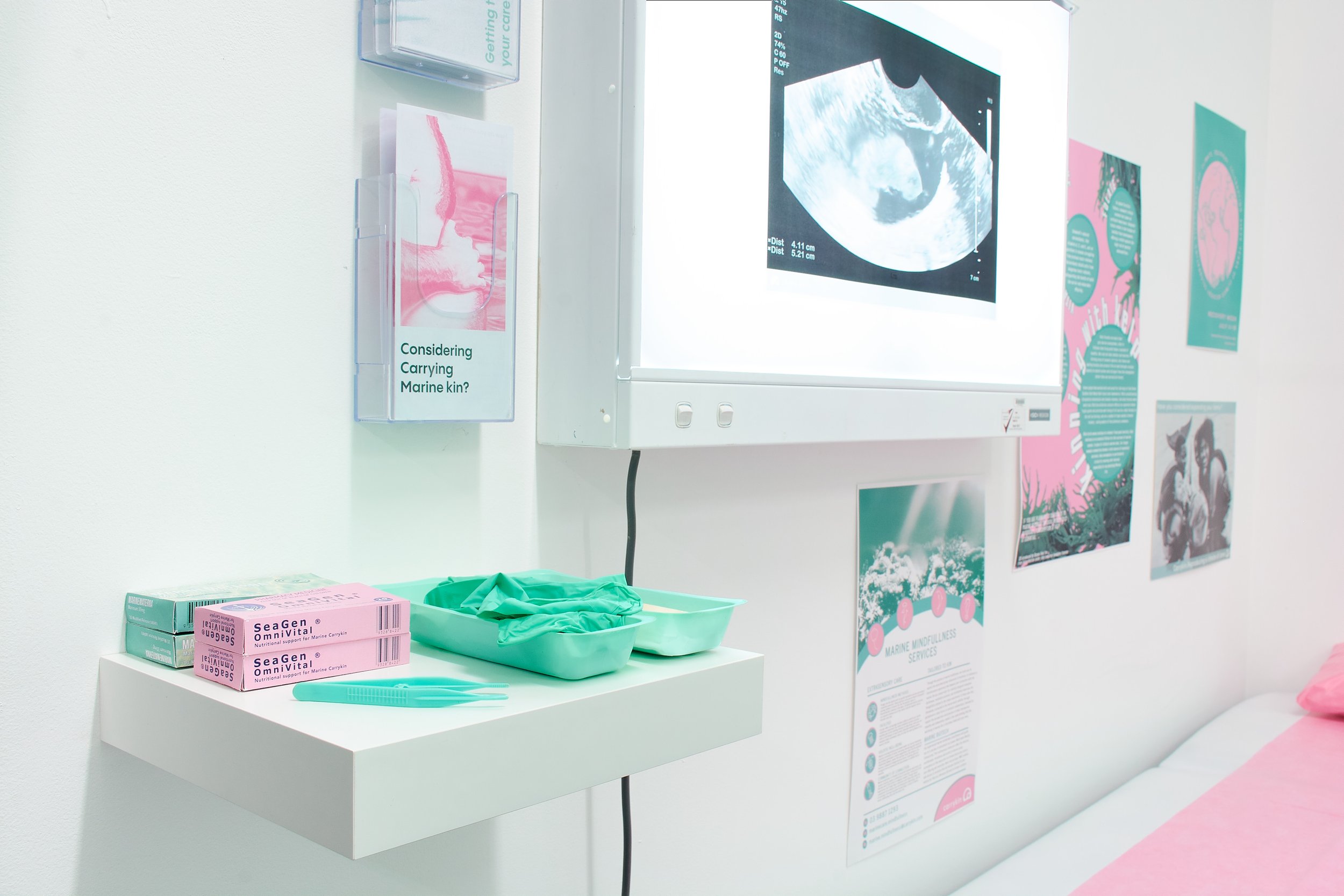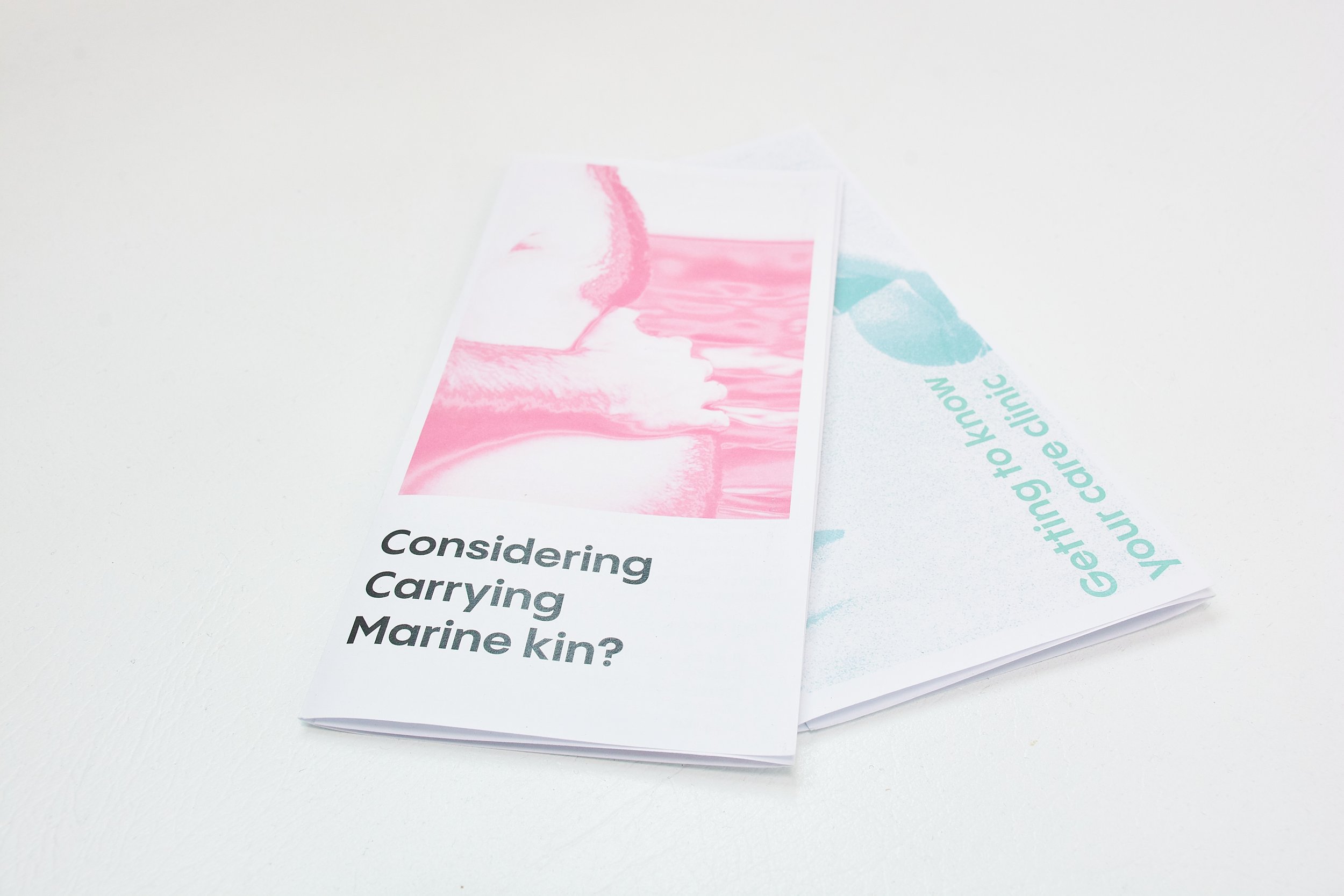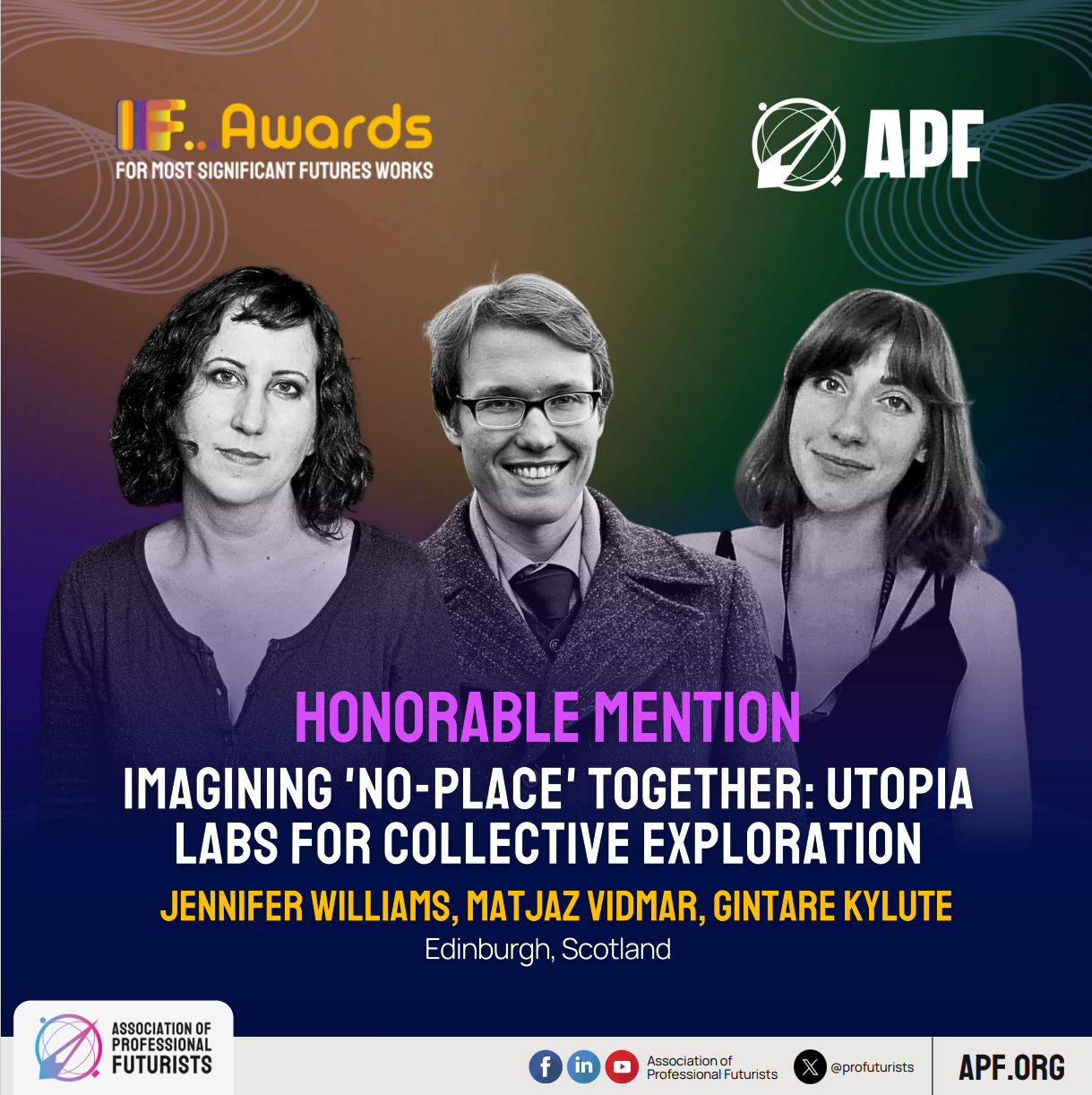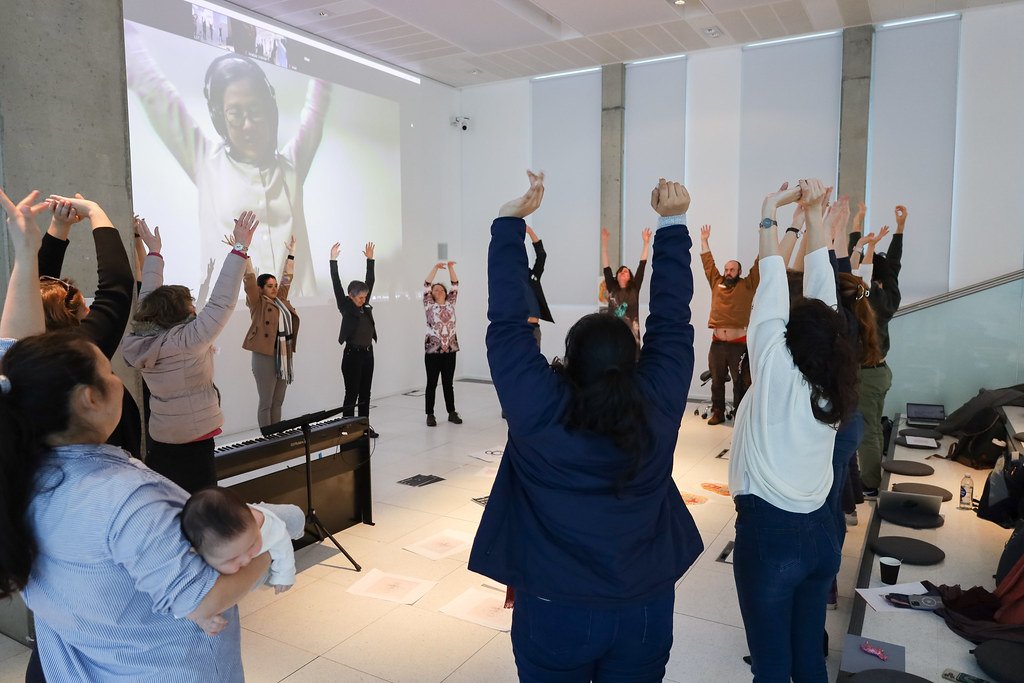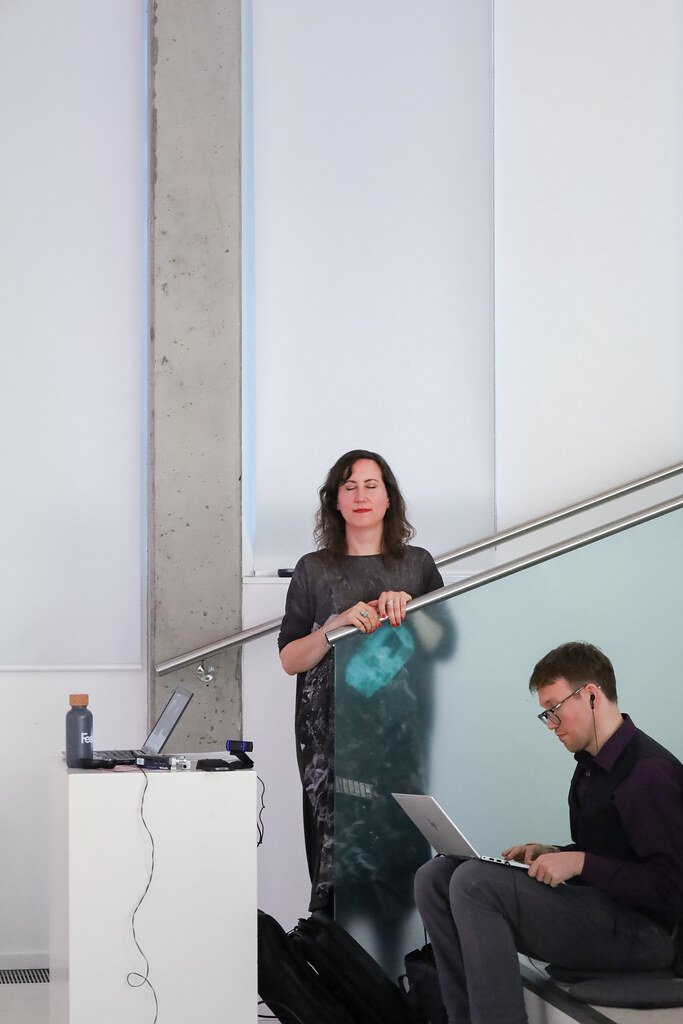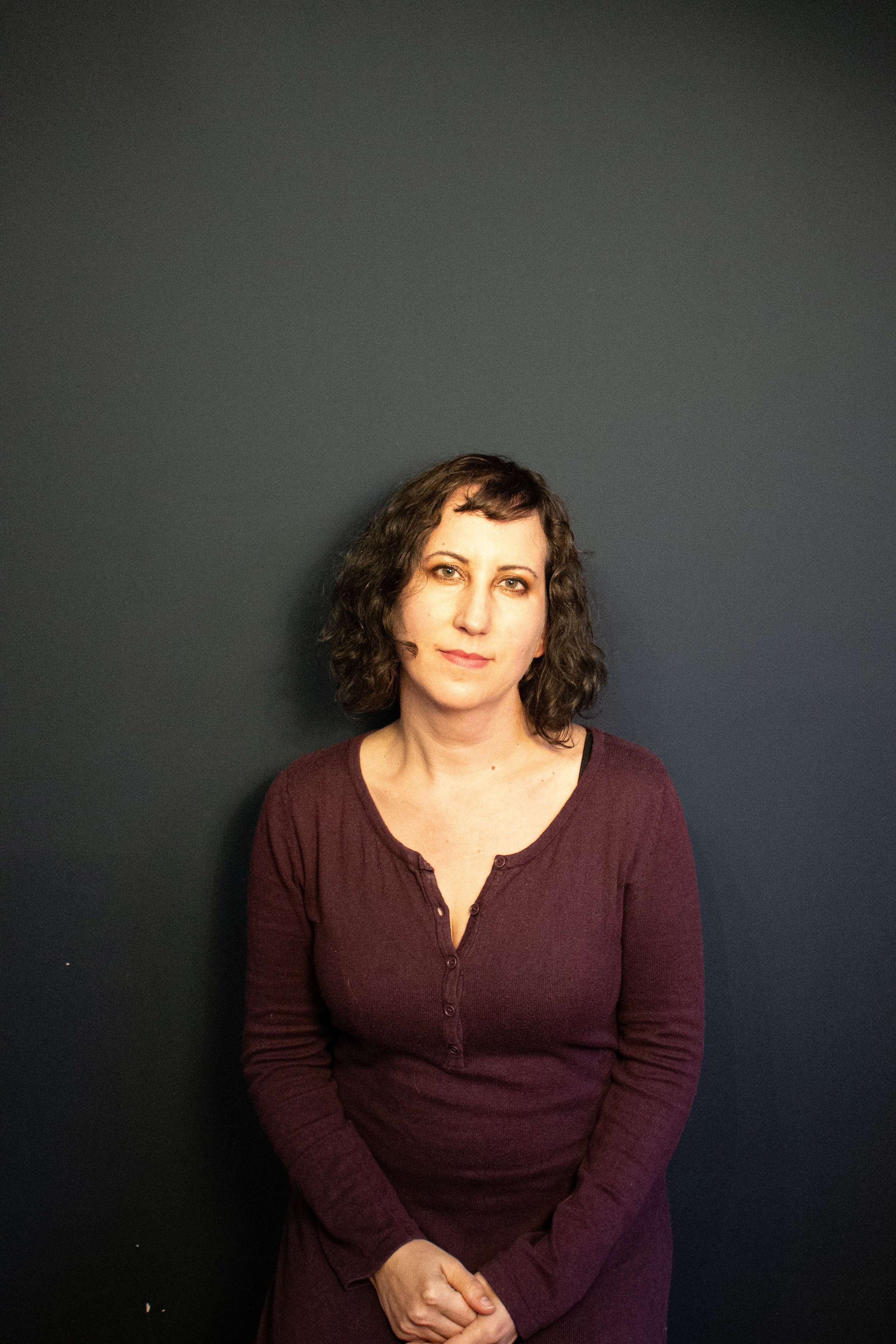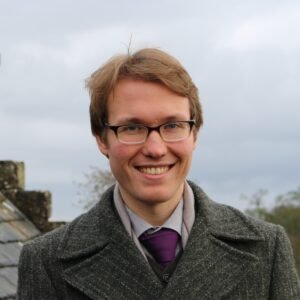We are delighted to continue our new podcast series based on the Winners and honorable mentions from the APF 2023 IF Awards. Today we hear from Luna Mrozik Gawler, an artist, writer and scholar based in Melbourne, Australia and their award-winning work on Interspecies Surrogacy and Jennifer Williams and Matjaz Vidmar and their Utopia Labs experimental futures process.
Interviewed by: Peter Hayward with Maggie Greyson and John Sweeney
Luna Mrozik Gawler - Interspecies Surrogacy
CARRYKIN was created as a part of the Microalgal Mobilisation for the Seaweed Appreciation Society. It features Worlding, fabrication by Luna Mrozik Gawler.
Graphic Design: Luna Mrozik Gawler and Stephanie Ochona
Dramaturgy: Stephanie Speirs
Jennifer Williams and Matjaz Vidmar - Utopia Labs
Transcript
Peter Hayward: Welcome to the FuturePod Spotlight Series on the APF IF awards for 2023. In 2022 the APF changed from the most Significant Futures Work Awards to the IF Awards. Let's hear from Maggie what the IF awards are all about.
Maggie Greyson: The awards served as an invaluable resource for pointing clients. and the future's curiosity towards understanding the nature of work.
If questions, What If X, then y, are central to what we do as curators, facilitators, and researchers in supporting communities, organizations, and institutions to explore the futures.
John Sweeney: In celebration of the APF 20th anniversary, MSFW was re imagined as the APF IF Awards to reflect the globality, diversity, transdisciplinarity of the organization and the futures and foresight field. The Reimagined IF Awards program recognizes the evolving excellence in futures and foresight work with an emphasis on key thematic areas such as impact, imagination, and Indigenous.
Peter Hayward: Those awards are done and dusted and now we are here to celebrate the winners and special mentions. So get ready to hear from people doing important futures and foresight work all over the globe that is innovative, inclusive, indigenous, and much, much more. So on with the show.
Okay, Maggie, who have we got?
Maggie Greyson: I'm really excited about this one. I'm really excited about all of them, but this one is particularly cool and sideways imaginative thinking.
In fact, it actually won in the Imaginative category. Interspecies surrogacy, a catalyst for climate recovery. CARRYKIN contemplates new models of kinship, the ethics of care, and the possibility of more equitable Biodiverse futures centered around climate recovery. This immersive installation at Blindside Gallery in Melbourne presented an examination room in a future community care clinic for an inter species surrogacy program using artificial womb technology. Design fiction that includes extensive world building with government policies, campaigns, On a scientific basis, the installation queers the concept of gestation to explore multi species kinship and care obligations to imagine a future of inter species care and climate recovery.
What I think is cool is the shift in framing climate crisis, catastrophe to climate recovery. So it's moving the discourse beyond a collapse scenario by provoking the potential. Now what scenario? The judges commended the project's innovative and transformative approach to rethinking human nature relationships through the powerful concept of human animal surrogacy.
They praised its immersive storytelling that connects emotionally and intellectually, provoking deep reflection on urgent environmental issues while inspiring hope for climate recovery. The multifaceted presentation with research Artifacts, campaigns was applauded for comprehensively exploring this speculative future.
Peter Hayward: Welcome to FuturePod Luna.
Fantastic to talk to you and I'm going to start with congratulating you for winning an award in the Imaginative category in the IF Awards for 2023 for Most Significant Futures Work. How was that?
Luna Mrozik Gawler: Oh, thank you so much. Really fantastic. Absolutely thrilled to be included in the award and to suddenly be thrust into this incredible conversation with the cohort of other winners and also the extended community. It's really been a remarkable experience. I'm very excited.
Peter Hayward: Great. So do you want to just explain to the listeners as best words can do, your work, the interspecies surrogacy?
Luna Mrozik Gawler: Yeah, absolutely. So the work that I was, given the award for is called CARRYKIN and it is an inter species surrogacy clinic and it's a space inside of a clinic from a future where humans are able to opt in for the temporary gestation and care of marine species as a way of approaching ocean restoration and habitat protection, starting to bring the ideas of kinship and multi species care to the most intimate corporeal terrain.
Peter Hayward: Yeah. Can you take us back to where that idea started to form for you? Cause there's so much going on in that.
Luna Mrozik Gawler: I can. There are many threads that fold through this work and I'm sure even just saying interspecies surrogacy clinic is already enough for anybody listening to have all sorts of ideas about what that might be.
It conjures all sorts of ideas around binaries and biologies, about birth, about survival, kinship, lots of things. But I've had quite a few different threads of each of the sorts of themes of the work that came about in a different ways and then finally materialized with an invitation to create this installation last year. And the first real encounter for me in thinking about the spaces between my human body and other bodies, their similarities and the poetic intimacies of that, particularly as water bodies and particularly as a body with a womb that has the capacity for pregnancy was when I was an undergrad at university. I did a poetry subject
and at one point they took us into the natural sciences school and into a storage room that was full of bodies, all sorts of multi species bodies. And we were asked to spend time in the space. and pick a vessel and a body inside the vessel and write to it. Just stream of consciousness. It wasn't for an assignment, just an exercise in thinking differently. And I saw a stillborn dugong and spent time with this impossibly soft, breathless creature that was untouched by the air of the world, except it had passed through its mother, who had died and they'd retrieved the fetus in death. And it came at a time where I myself had just had an abortion about five months prior.
So I was thinking really keenly about what these lives are and what the replication of life is. Of what life passed through our bodies is and where similarities arise in our experiences of birth across species. And so that was the very beginning of the seed of the work.
So that was one of the things that was swimming around in my own waters. As I started to move through learning different environmental philosophies later in life and particularly hydrofeminism and thinking through posthuman frameworks and finding my own way to my passion for the natural sciences through an artistic lens and particularly through a futures lens, I got really excited by Neil Shubin's book, Your Inner Fish. In it, Shubin talks about human evolution through the pathways of different species, and particularly comparative embryology, and looking at the remarkable comparison of other creatures as they gestate, and how long it is that we humans look like other creatures before we're born, how late in the development stage we mimic one another.
And the thing that really struck me was particularly sharks. We look so similar to sharks and I was stunned by that and went off on a great quest exploring all of the things that happen for gestation with sharks that don't use eggs that use placentas instead, and uncovering all of the marine spaces that do that and was absolutely amazing.
I was really excited by the comparison and then being an older adult of trans non-binary identity and particularly someone in their late thirties who has dealt with societal pressures to consider pregnancy and creating a family. It's a theme that runs really close to my heart, grappling with what family means, what kinship means and how we do family and caring otherwise, or kinning otherwise as Haraway invites us to consider.
And so for me, I started wondering about the possibilities of carrying a shark and the logistics of that and whether that was possible. I spoke to different artists and scientists, and as it unfolded, I thought what is the system that sits around that?
It's one thing to think about how you might carry a shark and me as an individual, but what is the potential impact if that was a regular component of birth practices, what might the benefit be if it was commonplace to birth other species? What might that mean for how we care?
Peter Hayward: That's terrific inspiration. Then when, and I've got to, I've got to put myself in the in the shoes of people who walked in and saw this exhibit. Because when you walk in and see the care space, I immediately think of Barbie. Because I haven't seen more pink in a space other than pretty much watching the Barbie movie. Yes, I can understand that. Really shocking, but intimate perspective of interspecies and then placed it in this girly, pink, playful space. So again, you're putting together the joy and silliness and lightness at the same time, a deeper emotional, spiritual connection with these species that are just like us.
Luna Mrozik Gawler: Absolutely. This speaks really to the heart of the kind of work that I like to make. My work is research driven and grounded in really urgent inquiry around how we're relating, as humans, to the rest of the world. Exploring how we behave and how our futures are extrapolating from that point and how we might change those futures by inviting people into the spaces like CARRYKIN to practice those futures, to perform them together. But in every instance, it really comes down to what I'm starting to call the methodology of delight, which is just the things that truly delight me. It's a very personal framework and for something like CARRYKIN, the thing that first came to mind was Community care spaces, what do they look like?
What do women's health spaces look like? What did they look like in the 80s when I was growing up? And you would go and see the nurses with the colorful posters and the cheesy brochures and everything is slightly clashing in the aesthetic, but is earnestly trying to be good marketing. And particularly I know that at the core of quite a few of the invitations in my work, the provocations are intended to be disquieting and fundamentally unsettling and CARRYKIN is, of course, like the suggestion here is that you can use a womb implant to carry a non-human creature that opens birth up to everybody, regardless of biology.
It asks tricky questions about obligation, about how far you would be willing to go. It has big ethical considerations about whether that’s okay. And particularly being in Australia, what sort of questions that opens up about. Access to other kinship lines from First Nations perspectives. There’s a lot to consider.
It's a really roiling work in that way. So I was really keen to present it in a way that felt warm and familiar and cheerful and easy. You walk into the space and it is, it's soft pink. It's a placental pink, but it's soft pink. The green is a lovely mint green taken from the kelp that we're talking about the cold ocean reef of the Great Southern Coldwater Reef off the edge of Australia and the restoration of the kelp forests. And the idea is that it's supposed to look inviting. You walk in and there's a bed there and there's posters and there's the ultrasounds and someone's might maybe just been in there, just had a consultation to become a carrier.
Even the framing of the project is intended to provoke a feeling of accesibility, CARRYKIN operates out of a community care clinic. What's a community care clinic in this future where maybe every suburb has one of these hubs. And what else might the care clinic do? Maybe loneliness. Who knows, maybe community gardens, care cuts in lots of different ways. I wanted it fundamentally to feel easy to engage with.
That's one of the things that I'm really passionate about experiential futures for the idea of inviting people in. And if I was to present this on a piece of paper, I think it might shut a lot of people out. It is quite a monstrous concept. But when you walk in and you say, there's a comparative embryology poster, that says the shared biology of care on it, and there are familiar cheesy marketing images that you might find in a doctors waiting room, or brochures and pill packets you can pick up and read. That you can pick up and inspect and feel, and there's an embryo in a in a dome that you can look at one of the womb plants. Each of those objects invites you to really think about yourself in that space.
And that was really the urge was to make a space. The full iteration of the work is absolutely intended to have a consultation process to have people discuss their own personal desires. To carry or not to carry? That's the question!
Peter Hayward: For me it goes to the core of separateness and hybridity. The notion that I am different to this. No, I'm not. Yeah. So every false dichotomy that I create for myself and the world, this thing says that isn't the case. And, but it's so gentle. It's seductive, but it's also completely frightening because to enter into that space is to, for me to ask the question where am I in this, is there an I, or is it all an extended we?
Luna Mrozik Gawler: I think there's a bit of an emotional whiplash that happens at this work where you do move backwards and forwards from the play and the horror and the realization that it's speculative, but it's, it's real and it's a possible future, but a present as well.
When you think about particularly people who come into the installation who have had children or are pregnant and are thinking about the futures of those. Children and offspring to think about putting those offspring in environments that we know are suffering in a way that we can't necessarily mitigate. I think there's a suggestion that in human civilizations, particularly in dominant Western cultures, that we might be okay, the human exceptionalist thinking that supposes no matter what happens we'll probably figure out a solution. If the ocean levels rise, we'll probably build seawalls fast enough. But when we're talking about non-human habitats, we know that loss is vast, and whether we know the statistics or not, everyone is living with the ongoing grief and terror around that, and the idea of placing someone that is directly from your family, your immediate family, I think into that environment terrifying, truly terrifying.
And so I was able to have these conversations with people, particularly on the opening night, and I came back a few times into the installation to restock brochures as they were enthusiastically taken, and have these conversations with people. So it was a little bit of a little bit of that and quite a bit of the understanding of, or the realization, the slow dawning realization that there is no difference between the families in other habitats and the families that we're creating in our own. I feel very privileged to have been able to have those conversations with people and that the work was able to lead people through that in their own framework.
I am really surprised at how many people, and I wonder how many people listening will have the same response. How many people told me they weren't interested in carrying any sort of marine species, but they'd already wondered and thought about the fact that if they could, they absolutely would carry a puppy.
It’s come up so many times and so many conversations in the installation itself, in spaces afterwards.
Peter Hayward: In our remaining time, I want you to pivot, if you wouldn't mind, Luna, and just unpack a quote from Donna Haraway that was on your website. And I'll read it out. Caring means becoming subject to the unsettling obligation of curiosity.
Luna Mrozik Gawler: Yes. So the full quote ends with a little bit extra. So I'll just read the whole quote. Caring means becoming subject to the unsettling obligation of curiosity, which requires knowing more at the end of the day than at the beginning.
So I've got that quote, as you mentioned, framing the project. on the website. I like to call back towards the research that's informed the work on each of the projects as they appear on my website. And I think it's challenging, particularly in a culture that's pushing us increasingly towards distraction, and there's an amplification of separation going on now where I would argue that we're moving even further through the cultures of dualistic thinking where nature and culture are pushed away from each other, where now we're also starting to move into separation from ourselves and our communities. And I think an antidote to that is, is curiosity. I think curiosity draws us in and it's beautiful in that way. It's an incredible invitation. It takes you before you even realize you've been taken. You go for a walk and before you know it, you realize you've got your hand on a leaf somewhere, or you're smelling something, or you're staring at the reflections of a cloud in a puddle.
It's a really important way of accessing the world and coming back to engaging in more than human spaces in the ways that are most fundamental to us as humans. You're driven by curiosity, driven by care. And I think that's what happens is curiosity draws you close. It wants you to bring your body to it, bring your imagination to it.
And more and more in the times that we're living in, I think this is an unsettling process. And as with, you might be willing to get on board with the beginning of it. It might sound quite cute. The idea of carrying seahorses are fantastic. Under the CARRYKIN program, you can gestate a thousand, very helpful.
You could carry roughly a thousand in a human body. And also the gestational period is 30 days, very short, perfect for someone who doesn't want to engage for too long, but also horrifying the more you think about it. And I think that is the function of this sort of a future is that it brings people on board with their curiosity, with their play and with their imagination before it brings them to the really hard conversations.
Peter Hayward: I think you mentioned it. It's not that I am necessarily curious, it's such that I have this force within me that might not even seem to be me. That is curiosity, and I am carried by it, and I think you described that experience of where your curiosity took you to a place where suddenly conscious self realized it hadn't been, it hadn't been in charge.
Luna Mrozik Gawler: Absolutely. Absolutely. I think it's something that, that moves through us and is, and it's fundamental to us, I think it's, the way that innovation happens, of course, and it's easy when it gets relegated off into the realms of play or inspiration or something like that, when we're talking about innovation or speculation.
But I think there's something else. That is at the core of that. I think there's something else really true in there, which is the curiosity that drives us through the world that, that makes us wanting to, makes us want to ask questions. What is the what if question that we ask in futures if not deep curiosity. And I think if we can ignite curiosity in people even though it might mean knowing more than you knew at the end of the day than you knew at the beginning, which might be uncomfortable in the context that we're particularly, context that we're particularly speaking in around futures at the moment, and for me, particularly being someone who works in ecologic futures, I think there's a great power in that.
I think it's very potent and a very exciting space. And it's, again, why I'm so passionate about participatory and experiential spaces that give people the opportunity to be carried in first. And then engaged intellectually after.
Peter Hayward: Yeah, and then, and changed. through the experience. That is that second part of the Donna Haraway. You don't just play with curiosity, it plays with you. Yeah. And you are not in control of your curiosity anymore. And what emerges from curiosity is a thing that is changed.
Luna Mrozik Gawler: Yeah, it's a transformational process. And I think that's the very the very least that we can hope for in making any sort of futures work is to provide at least the kernel of transformational experience and thinking for people, whether it appears inside of the immediate engagement or whether it unfolds in the time that follows as it tinkers away in the back of the mind.
Peter Hayward: What's next? You mentioned that Carrykin is a kind of, I'm going to call it proof of concept, which is a horrible term, but I think it's close to the idea that, is there something here? Yes, there is. Can you talk more about what that is? What are, what are your hopes and aspirations for Carrykin as a broader process?
Luna Mrozik Gawler: Absolutely. And you're right, this this iteration of CARRYKIN was absolutely a test. I like to work in iterative ways, particularly because my passion is world building and experiential spaces. It's really helpful to be able to start with small versions as you say, as a proof of concept.
And CARRYKIN was such a wonderful reception, but it is absolutely intended as a much larger work. And so that's still being developed actively at the moment. The intention is to actually have a functional clinic space and have people come in and be able to do their own sorts of consultations, to sit down with a CARRYKIN clinician and talk about being on-boarded onto the program and to talk about the sorts of species that they want to carry to talk about their nutrition that they would need to be providing for themselves, but also for their non-human kin and to think about the real specificities, the deeply personal, intimate specificities of what it would be engaging in this program with a very long view through it as well.
So CARRYKIN is also intended as a vision of an intergenerational future. So there is also a kernel of a story playing out in the background of this, which is questions around what happens when we carry bodies inside of our own, in the cellular exchange that occurs, and what then happens to humans as time passes. What is it to be the third child of someone who carried several sharks before you? What becomes of your DNA then? And in multiple generations of that, what happens across time? Ideally what I would like to be able to do is to be able to bring this to people, to be able to create the clinic space. To have the live component and also there's a video work that's in development at the moment which is interviewing people who have already been through the program.
Oh, and I'm working on a long form text in the meantime because there is quite a bit of this world so it needs to be documented somewhere.
Peter Hayward: Awesome. Look, I just loved the work. I was completely transformed, horrified, excited at the same time. On behalf of the IF Awards and the APF, congratulations again for the award. And on behalf of the FuturePod community, that I know you're part of, thanks for spending some time together.
Luna Mrozik Gawler: Oh, thank you so much. I'm yeah, very grateful to have been here and loved chatting. I'll just say, just to the previous question, should anyone feel like funding the full iteration of CARRYKIN or have a space that they would like to have CARRYKIN extrapolated inside of, please do reach out.
Certainly do that. Thanks, Luna. Thanks so much.
Peter Hayward:I hope you are enjoying the podcast. FuturePod is a not-for-profit venture. We are able to do podcasts like this one because of our Patreons. Like Charles Brass who's been an active patron since we started over five years ago. Thanks for the support Charles. If you would like to join Charles as a patron of the Pod then follow the Patreon link on our website. Now back to the podcast.
Peter Hayward:Thanks, John. So who is next?
John Sweeney:Thanks, Peter. I'm thrilled to share that Jennifer and Matt are going to speak about the honorable mention that they received for their inspiring project, imagining no place together utopia labs for collective exploration. These innovative utopia labs explore the idea of utopia.
As a no place for contemplation, bringing together academics, artists, entrepreneurs and students in slow experiential sessions that encourage open exploration, dreaming and creativity without prescribed solutions. What really sets this project apart is its unique approach to envisioning the future, resisting frameworks, and very much focusing on the open ended ideation that is critical to these types of embodied and shared learning experiences.
It actually combines yoga, meditation, visioning, and really even the idea of connecting with people, so even a shared vegetarian lunch. To have a place for people to slow down and to really try to deeply connect with one another. Overall, Jennifer and Matt's and their team's project really offers you a fresh perspective on the concept of Utopia, seeing it as a catalyst for inquiry.
rather than a blueprint for, of course, a perfect and unachievable society. By curating interactions between diverse disciplines through innovative communication, and really by believing that change starts by looking inward and connecting to others, the Utopia Labs aim to create impacts that can reverberate far beyond the sessions themselves.
Peter Hayward: Welcome to FuturePod, Jennifer and Mat.
Jennifer Williams: Thank you, Peter. So wonderful to be here. I was wondering if it would be possible to take a moment to start with the way we always start in Utopia, which would be having a little breath together, if you would join me in that, would you be up for that?
Mat, you okay with that?
Matjaz Vidmar: Yeah. I'm always okay with that.
Jennifer Williams: Amazing. So if you just put your hand on your heart, wherever you can feel it and take a deep breath in. And
a deep breath in,
and out,
and another breath in,
and out. And I'll just tell you a little tiny poem while you're resting. The past echoes the future echoes the past echoes the future echoes the past echoes the future echoes...
Thank you so much. I think we can officially consider ourselves in utopia now.
Matjaz Vidmar: We've landed. Yes. Lovely.
Peter Hayward: The balloon has come down. Lovely. So welcome again, congratulations on your Honorable Mention for the work of Utopia Labs and the work of No Place I think is what we're going to talk about. Who wants to start the conversation with a bit of the genesis of No Place?
Jennifer Williams: Shall I kick off, Mat, and then you can talk a little bit about what it was like to be there at that first one?
Matjaz Vidmar: Absolutely, sounds like a good plan.
Jennifer Williams: I started working at the University of Edinburgh in 2016, and I noticed all around me that people were so busy, rushing around all over the place, but hardly anyone was really, somehow connecting and I kept running into people who were working on similar projects, but hadn't had the time to sit down and talk to one another about it.
And it was heartbreaking, actually, to see all these brilliant minds filled with so many ideas and all of them kind of scattering about rather than coming together. And I just had this very strong feeling that I wanted to create a space where we could slow down, we could breathe, we could remember that we're not just brains, that we have bodies, and that would be a really valuable space in which to then have conversations with one another and think about the future together and start imagining what those futures might look like- which then gives us a chance to consider what steps we might like to take in the present to open up the possibility of those desirable futures taking shape.
And I think certainly at least at the university this is quite not like the kind of spaces that are normally there. So it felt like a very challenging project to get off the ground, but in that way with certain ideas that seem to just come out of your heart and you can't put them back in, I just kept talking to one person who said, ‘Oh, you have to talk to this other person. You have to talk to this other person.’ And I was eventually connected to someone called Paolo Quattrone, who at the time was working on getting the Edinburgh Futures Institute off the ground. And we've since had two other directors and now a new interim director at EFI: Lesley McAra, Chris Speed and Kev Dhaliwal.
And we're about to open our doors to the public. So that's been a huge project. (Edinburgh Futures Institute: The biggest challenges facing societies globally are complex and interconnected. Our approach is participatory and future-facing. We recognise that insight, innovation and impact come from bringing people and knowledge together.) And amazingly, they've always kept Utopia somehow tucked into EFI as an idea that they were interested in and they've let me do all sorts of experiments and this idea of Utopia Lab itself, the name of it came because I was trying to think about this space I wanted to create and I was, I must have been just doing some research and this idea of utopia came up and what I was so fascinated by and what I didn't know about before I'd come across this was this idea that utopia in the way I think we often think about it now, this idea of a perfect place really came from Thomas More's book called Utopia that was published in 1516, but that the kind of original Greek word had another meaning which was this no place.
And I just found that to be such a powerful notion - this idea that we could have a ‘not perfect’ place with all the potentially impossible connotations and pressures that might put on someone. And in fact, there are certain people who are very scared of utopia because of its potential to lead toward totalitarianism or fascism. Obviously that is all to be avoided at all costs. But I was really interested in this, not a perfect place, but a kind of blank canvas, an empty space that we could travel to, to dream about the future and to imagine together other possibilities. And it's that idea of a multitude of possibilities and being able to discuss them and bring them back to the present, to think about them...
that was really of interest to me. Utopia isn’t just one thing – it needs to be a space that can support multiplicity and diversity, the dreams of many (even if those are conflicting dreams) rather than the one ‘ideal’ dream. Mat who's with us today was one of the very first people in the first Utopia Lab experiment that we ran in 2019. It was about a week long and there were, how many of us were there, Mat? About 10, 10 of us.
Matjaz Vidmar: I'd say something like that, yes. And yeah, I was one of those busy people, I think, when Jennifer and I met
I still am, one of those busy people running around, not having enough time for meaningful conversations.
So, when I actually met Jennifer, she led, and I was involved with, was something called Festival of Creative Learning.
Which, if you look at it, on first glance it's very different from Utopia because it's a very busy place. It's a curated a week-long sort of reading week where we've invited students to basically, down the books and the usual methods of learning, and learn in different interesting ways with encounters and performances.
For example, I was fixing a railway once, as part of the Festival, it really included all sorts of things. But the interesting thing about the Festival is that it was much like how we talk about Utopia - disrupting the busyness, and the every day routine nature of a lot of our academic intellectual work. And these kinds of interventions allow us to reflect and pause and clear our minds a little bit and in that space also dream.
Yeah, I was there in that first Utopia Lab.
Jennifer Williams: What did it feel like to you Mat? What was it like for you in that space?
Matjaz Vidmar: One thing that, I think, not just me, but a number of us were realizing is that it took us a while to really let go and to calm down and slow down and leave all the other busyness and all the places and all the burdens and other things we're carrying in front of the door and really walk in there.
And relax. That deep breath we all took at the beginning of this podcast.
And then it was fascinating because as you do that you really meet in a different place. You really work from a very different kind of common denominator. We weren't meeting as experts or academics or students and staff or, all of these sort of ways in which we structure and organize every day and thoughts and feelings into kind of regimented sort of little boxes - that all slowly fell away.
And we were just really exploring ourselves in the first instance. And then our interactions with others became filled with ideas, which kind of came almost right at the end. So, an awful lot of time, actually, I think, was spent in in letting go, in finding the no-place, which probably is not surprising.
Not just because ofthe way universities and academia are structured, but also these days the life is just so busy. We keep saying this, right? We're so inundated with information, with media, with content and we just need more time to pause.
Peter Hayward: A couple of things strike me, Jennifer and Mat. First is, of course, the notion of emptiness. But nowhere is also an empty space, and so there's this notion of letting things go. As someone once, very clever person once said, you let go to let come. The notion of putting down in order to let the next thing turn up. And something else I used to say, tongue in cheek, but also quite serious that while some call themselves Futurists, we actually are radical Presentists in the sense that the best futures work, the best conversation, the best anything, the best game of golf, the best cooking performance happens when you are as present as you can be. And the future is the property of how good our present is.
Jennifer Williams: I love that idea. Yeah, on the one hand, I totally agree with you about the letting go for something else to come in. But in a way, the thing I'm most interested in with Utopia, and perhaps in life, is the letting go. And I actually think what's so radical about that and what's so difficult about doing that is it goes against everything that I feel like we're taught, or certainly I was taught as a person growing, I grew up in America, very... in so many ways, there were hard things about my childhood and growing up, but privileged in so many ways compared to so many people in the world.
And these ideas of always doing, making, buying, having more, getting more, going for the next thing it... it's so privileged and it's just left me feeling... I have a four-year-old daughter now and I'm, this is a terrifying world to bring her into and I keep thinking, how do we let go and not worry about the next thing coming in?
How can we just be, how can we just be still? How can we stop doing all the time? Because many of the activities we do in high income and industrialised countries, where we can afford to do more than just survive, these activities are coming at great cost to people, animals, plants, the well-being of our entire planet and even that's a privilege again, to be able to stop... there are so many people in the world who couldn't stop because if they stopped, they wouldn't have food to eat and to bring home to their families or they would be in danger in some way.
Again, I think sometimes sitting in a room at the University of Edinburgh with the sun shining in and us all dreaming about utopia, it can feel, there could be a feeling of feeling almost guilty about being able to stop in that space. But I think in the lives we're living, it's, it feels to me so important, so vital to explore that kind of space and not to be doing it with an intent to make something happen. More will happen – whether we do anything or not, but I would like us to be rested and connected and peaceful and prepared, rather than rushing headlong into our own doom.
Matjaz Vidmar: I would agree. And the feeling was definitely of a sort of intense vulnerability really, that kind of comes with not doing things, not performing, not being productive. Partially, I think there is really a kind of deeply ingrained notion thatour worth, or self worth, is to a degree associated with our activities, things we do.
And not just with our presence or with our seeing the world or listening to the world or feeling things. And I think that realisation was really intense. I think you remember, Jennifer, that we've each felt compelled to perhaps put forward or maybe discuss a dimension of that vulnerability.
And there were, I think, different expressions from different people who were there, but nonetheless, I think there was lot of very raw kind of reflection and just honesty with oneself. And I think that is really the interesting thing,one of the most interesting dimensions of this method or the tools that we're trying to develop within this little lab.
Jennifer Williams: And Peter, Riel Miller, he was there in that first Utopia Lab as well and it was wonderful to have that time with him. And so there is within these labs, we try to bring in futures practitioners. We try to experiment with different kinds of frameworks and methodology.
Once we get into that space and really, really connect, we always do a little bit of yoga, meditation, poetry, we really try and get there. Get deep down before we start and then bring in these different kinds of either... people of all sorts; artists, teachers, data scientists, anyone can come in, share their visions of utopia.
Which again, it's not necessarily their vision of a perfect place, but the future they’d like to see. And then, we bring in different practitioners to help us respond to and bounce off of those visions that have been shared. But again, I would say the goal is not necessarily to come up with a particular project or answer or that we walk out of that room knowing, okay, now we're going to do this next thing. And it was interesting, actually, because one of the feedbacks from the, when we got the honorable mention was, ‘It would be helpful if you could show your outputs more.’ And it was really funny because part of me was like, I can totally understand and in a way I could see that is good advice... but at the same time, I would say that's almost the very thing we're resisting. And it's so hard to resist, especially within a university context or any kind of funding context, I feel like it's all about showing what you've achieved. And for me the things are so fragile. It's, it might be that in a month or a year or five years, someone is about to hit send on some angry email and then they stop and they think, wait a sec, I’m just going to put my hand on my heart and take a breath before I do this. You know, it's the butterfly wing. It's just these tiny moments that might, these tiny little ideas and moments of connection and ways of being that might enter into someone and then affect them,the way they do things, the way they act in the world. And for me, that, that's my dream, it's that making these spaces and inviting people into them to have these conversations... It's not, it's not that I would say, we've talked about all sorts of possibilities. Maybe we could have a Utopia Fund to help people do projects that they come up with in Utopia Labs, or, maybe there are more tangible ways to have outputs but there's still a part of me that kind of goes... no, I just want to, I just want to let people carry it in their hearts and see if it makes people feel a little better and behave in ways that, you know, yeah, think about the world differently. How we feel, how we think, how we behave... that is what makes up our experience of the world and most of us don’t have much control over anything other than ourselves, the way we choose to behave and the ways we move through the world. Do we really have a choice? That’s a question for debate but even if we have a feeling that we can pause and in that space choose between helpful or harmful behaviours; there is some starting point there for hope, and for change.
Peter Hayward: Part of what you're doing is a dialectic process. You're creating a space that is unlike other spaces. It's saying the other spaces are the other spaces, but this space is not that. And in the dialectic, there is the possibility of synthesis. There is the possibility of evolution. And wants to not be in order to add difference so people can choose rather than have it chosen. As one of my heroes, Humberto Maturana, had a phrase which was, do we choose our choosing and do we want our wanting? And it was very much that notion that we can often be programmed, think we're choosing, but it's really not a choice. It's actually chosen us.
Jennifer Williams: Beautiful.
Peter Hayward: In our remaining time, because we're spending a short period of time together in Utopia, from an educator, facilitator, what have you really learned about working with busy people? In order to get them to a space like this,
Jennifer Williams: I think my first really big learning point is… it's about, I think that it can be really scary to open these spaces up, but actually people really value them if you take them with you. And it's like what we did at the beginning, just asking someone to take a breath, sometimes in certain rooms, in certain contexts, it's terrifying to ask people just to do something like that. ‘Just think about taking a breath with me’, but the way even just that most simple of exercises changes the whole dynamic in the room is, it's really powerful. And I think it really does, it does in so many ways just remind people that they are human beings and that they have bodies and that other people are like them too. And that's just such a good point for starting to talk about things, especially challenging things. Mat, do you have a, do you have a feeling about this?
Matjaz Vidmar: Yeah, I think - this is a slight twist because of course, you can take an engineer, a kind of a structuralist, like me, out of a structured space and put them in utopia, but you can never quite take the engineering out of me.
So, I was looking at the model and we were talking about what are the kind of elements that made this space special or, what are the kind of things that happen in Utopia? And I think that letting go is really is at the core - there's so many nuances of it, but it really is so critical.
It is really the portal into this no-place.
There's also definitely something about articulating, especially articulating things that aren't necessarily academic, intellectual concepts. For example, Jennifer very gently, very kindly over the past few minutes encouraged me to talk about my feelings.
How do I feel? How did that make us feel? How does does it feel being present within our bodies and within spaces that we are interacting with? And with other people that we're interacting with - how does that make us feel and how does that make us whole, which I think is very interesting.
Being able to express that is, I think, extremely valuable.
And then, I think, the third thing was making together in different ways., The first few times we've done it, we took making things together very seriously. We asked – in the no-space we've created for ourselves, what would we be making within it?
Again, very much not projects or this sort of “output” kinds of things, but, remnants, reverberations of thoughts and conversations and feelings we've had with each other. I think those early experiments kind of evolved in different types of activities. Sometimes that is about eating together, having food together.
Sometimes it is about performance, but there is always some kind of activity exploring how do you go through and interact with others in this space.
We did try for the UNESCO Global Futures Summit to actually try and capture some of these signposts to Utopia in a more guided experience, something that can be facilitated.
But it also comes down to the fact that every single time Jennifer puts together a new generation of utopians, a new group of people who will think and feel and create these new spaces, a completely new space emerges. And so from that point of view, it's not just something for which it makes sense to talk about how you replicate or how you facilitate Utopia.
Maybe there are some common points in these approaches that we've developed over the years, but also, the real essence of it is to having the group of people and creating the right kind of environment in which people are happy, people are willing to open up, and then in the end it becomes a joyous moment.
Participants are happy to be vulnerable in this space and to share themselves in this particular way. And as Jennifer has proven right at the beginning of this broadcast, she's amazing at getting you there, even in a short taking of breath and a very short poem.
Peter Hayward: Yes. So Jennifer, I'm going to, I'm a huge fan of ritual processes, so you began us with an entering exercise. Could you give us a short exiting process, because this space is going to end shortly.
Jennifer Williams: I'd love to... I think I might ask you again to take a little breath with me. Maybe this time, if you're able to, you could reach your arms up toward the sky as you breathe in, like a bird flying up toward the sky and then release your arms down, and up again,
and once more...
Peter Hayward: Thanks Jennifer. You're very welcome. Thank you very much for spending a little bit of time with FuturePod community. Again, congratulations on your Honourable Mention, and I hope to hear and see more work of Utopia and Nowhere. But thanks very much for this chance to spend some quality time together.
Jennifer Williams: Thank you, Peter. Thank you for coming to Utopia with us.
Peter Hayward:I hope you enjoyed hearing from Luna, Jennifer and Matt, and their amazing work. I'm Peter Hayward and I'll see you next time, but I will give John the last word on this podcast.
John Sweeney:Hi, everyone. Keep an eye out for the Association of Professional Futurists call for submissions for the IF Awards come August. If you have a futures project you're working on or considering, this is a fantastic opportunity to share it with the APF and the broader futures and foresight community. The IF Awards recognize excellence in futures and foresight work across nine themes, such as Impact, Imagination, and Indigenous. Stay tuned for insights from past winners published in Compass, And the upcoming APF membership events.


